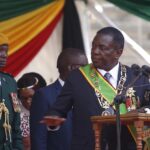Harare – A fresh financial scandal has erupted within the government Treasury, implicating senior officials in an illegal payment of nearly US$100 million linked to gold supplies. The scandal, involving an obscure entity with ties to a prominent Zanu PF gold baron, has ignited outrage and raised serious questions about corruption and mismanagement of public funds.
Confidential official documents seen by The NewsHawks reveal a venal transaction involving Gaingrid Investments (Private) Limited, an entity contracted by the government and Reserve Bank of Zimbabwe (RBZ) to buy and sell gold to boost the country’s bullion reserves.
Critics, including war veterans leader Blessed Geza, allege that Gaingrid is linked to Zanu PF MP and gold dealer Pedzisayi “Scott” Sakupwanya, a close associate of President Emmerson Mnangagwa. While company searches have failed to definitively identify Gaingrid’s directors, evidence of payments made to the company is well-documented and undeniable.
Through this arrangement, Gaingrid, despite lacking a credible public profile and track record, was granted a massive deal to purchase gold from small, medium, and large-scale miners across the country. The company was entitled to a 5% incentive from the Ministry of Finance, Economic Development and Investment Promotion (MOFEDIP) for gold delivered to Fidelity Printers and Refineries.
As a result, Finance Ministry permanent secretary George Guvamatanga, Treasury’s chief accounting officer, claimed that the government owed Gaingrid US$60 million, which required urgent payment.
However, a messy repayment arrangement agreed upon in September last year stipulated that the government would pay Gaingrid at least US$8 million in monthly instalments for 12 months, resulting in a total payment of US$96 million – nearly US$100 million – significantly exceeding the purported initial debt of US$60 million.
This discrepancy suggests that a financial cushion of approximately US$40 million – US$36 million to be precise – was created for unexplained reasons, potentially serving as a transaction cost, commission, or simply “money for the boys,” a euphemism for bribes and kickbacks.
Latest information indicates that the government has been making these payments to Gaingrid, with the outstanding balance reportedly reduced to US$36 million as of April 7, 2025. A further US$6 million was scheduled to be paid within seven days from that date, by April 14.
This information is contained in a letter dated April 7, 2025, written by Finance ministry senior economist Itai Munaki to Ecobank Managing Director Moses Kurenjekwa.
Ecobank’s Role and Discounted Treasury Bills
Ecobank is at the centre of the deal, acting as the conduit for the movement of funds and the buyer of Treasury Bills held by Gaingrid at a heavily discounted rate of US$20 million, a third of the face value.
The bank agreed to discount the 5% incentive – US$60 million – owed to Gaingrid to US$20 million, although the repayment amounted to US$100 million, according to official documents. This confusion appears to be designed to facilitate fraud on public funds.
A source told The NewsHawks that “there is method in the madness.”
In a letter to Kurenjekwa, the Ecobank boss, Guvamatanga stated that he had secured a US$20 million discount deal to settle the US$60 million debt to Gaingrid. However, in the same letter, he also stated that his ministry undertakes to “irrevocably pay” Gaingrid at least US$8 million monthly for 12 months, totalling US$96 million.
Illegality and Unconstitutionality
Apart from the questionable figures, murky repayment arrangements, cronyism, and the stench of corruption, legal experts argue that the transaction is blatantly unconstitutional and illegal.
In terms of the Public Finance Management Act [Chapter 22:19], the state has the authority to raise or borrow money from the market for its operations, including through Treasury Bills, but only through the minister, not the permanent secretary as done by Guvamatanga, worse still not by a junior official.
In the letter to Kurenjekwa, dated September 4, 2024, Guvamatanga writes:
“The Managing Director
Ecobank Zimbabwe Limited
Block A, Sam Levy Offce Park, 2 Piers, Road, Borrowdale, HARARE.
Attention: Mr. M. Kurenjekwa
Dear Sir,
RE: USD20,000,000.00 (TWENTY MILLION UNITED STATES DOLLARS) CASH PLEDGE AND COLLATERISED FACILITY AND SUPPORT LETTER FOR GAINGRID INVESTMENTS (PRIVATE) LIMITED LOAN REPAYMENTS
The Reserve Bank of Zimbabwe and the Government of Zimbabwe has contracted Gaingrid Investments (Private) Limited (“Gaingrid”) to assist in boosting the County’s gold reserves.
Through this scheme, Gaingrid willbe purchasing gold from small, medium to large-scale miners across the Country. Graingrid willbe entitied to 5% incentives from the Ministry of Finance, Economic Development and Investment Promotion (MOFEDIP) for gold delivered to Fidelity Printers and Refineries.
As such Ecobank has agreed to discount the 5% incentives owed to Gaingrid currently of USS60 million by MOFEDIP. Ecobank has agreed to discount these receivables up to a limit of USS20,000,000.00 (Twenty United States Dolars) (“The Facility).
MOF undertakes to irrevocably pay Gaingrid monthly installments of at least USD8 million or their incentive claim for the next 12 months using the Ministry’s funds held with Ecobank or any otherbank thereof.
The ministry will pay these incentives to Gaingrid account held with Ecobank.
These payments will be made on or before the 10% of every month. All facility fees will be by Galingrid.
MOFECIP has authorised George T. Guvamatanga whose signature is appended below, to represent the Ministry and sign this document and give effect to the above said arrangement until the facility has been paid in full.
Yours faithfully
For and behalf of the Minister of Finance
SECRETARY.04 SEP 2024
Geòge T_Guvamatanga
SECRETARY FOR THE FINANCE, ECONOMIC DEVELOPMENT AND INVESTMENT PROMOTION.”
In the April 7, 2025 letter, Munaki writes to Kurenjekwa on behalf of Guvamatanga:
“07 April 2025
The Managing Director
Ecobank Zimbabwe Limited
Block A, Sam Levy Offce Park
2 Piers Road
Borrowdale
HARARE
Ref: Secretary for Finance & Economic Development Mgandane Dodlo Bullding
Corner Samora Machel Avenue/Simon V. Muzenda, Harare, ZIMBABWE
Attention: Mr. M. Kurenjekwa
Dear Sir,
RE: CONFIRMATION OF OUTSTANDING GOLD INCENTIVES FOR GAINGRID INVESTMENTS (PRIVATE) LIMITED
The Ministry of Finance, Economic Development and Investment Promotion (“MoFEDIP”) wishes to confim it is owing US$36 million which relates to 5% gold incentives.
In the next 7 Days we shall be making a payment of USD6 million in respect to the above.
We hope you find the above to be in order.
Yours faithfully
For and behalf of the Minister of Finance
I. Munaki
FOR SECRETARY OF FINANCE, ECONOMIC DEVELOPMENT & INVESTMENT PROMOTION.”
A Pattern of Financial Misconduct
The gold deal scandal comes on the heels of another controversial transaction in which Guvamatanga was accused of providing an “illegal and unconstitutional” bank guarantee for a US$20 million loan to Valley Seeds, a seed company linked to command agriculture corruption.
Guvamatanga, in a letter to Ecobank, said Zimbabwe owed Valley Seeds US$191 578 835 as of February 2025. Ecobank, the permanent secretary added, had now agreed to discount this legacy debt “up to a limit of US$20 million” which would be advanced as a loan to Valley Seeds, with treasury paying it back in instalments of US$5 million in a 12-month period, taking it to US$60 million.
Former Finance minister Tendai Biti has described the transactions as looting on a grand scale.
Repeated efforts to get comment from Guvamatanga failed as his phone was not going through at the time of writing.
These incidents have raised serious concerns about the management of public funds and the integrity of the financial system. Critics argue that the Ministry of Finance, Economic Development and Investment Promotion has become a crime scene, with public funds being looted by a network of corrupt businessmen and their official accomplices linked to President Emmerson Mnangagwa.
Insiders say the ministry is now run like a piggy bank amid lack of transparency and accountability in decision-making processes, payments and inadequate oversight. This has eroded public trust in the ministry and government’s ability to manage public funds responsibly and for national development. Corruption has had a devastating impact on the economy and people’s lives.
The latest revelations are likely to fuel further public anger and calls for accountability and transparency in the management of public finances.

Follow @MyZimbabweNews












